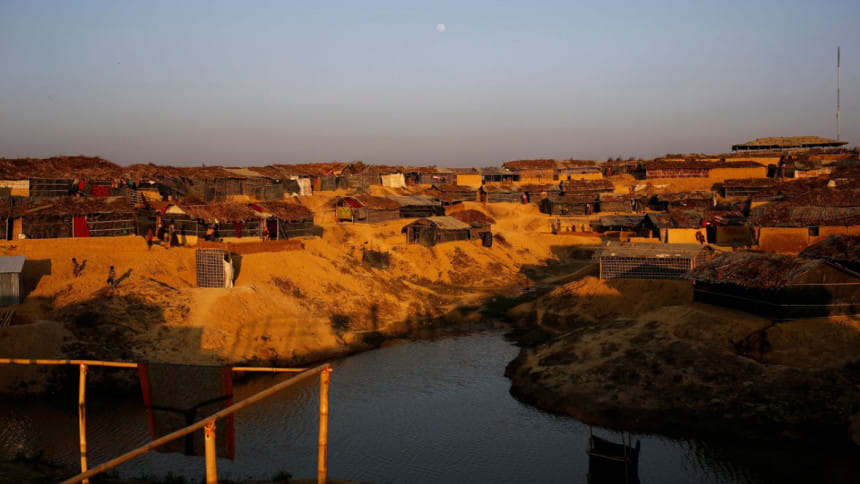A stalled repatriation bid and some lessons for the future

In mid-November, the world was watching with apprehension the unfolding drama surrounding the repatriation of the first batch of Rohingya refugees to Myanmar. All arrangements were completed at both ends of the Gumdhum border point, with buses ready at Unchiprang Camp in Teknaf to load the refugees with necessary provisions and supplies. Instead of boarding the buses, the refugees came out in hundreds against the repatriation attempt and emphatically refused to return to their homeland for fear of fresh persecution and confinement in the camps in Rakhine.
The refugees were given voluntary choices, thanks to the Refugee Relief and Repatriation Commissioner (RRRC) and the government of Bangladesh. No one was forced to return to Myanmar. The repatriation plan was abandoned, and now rescheduled for 2019.
Meanwhile, all available reports indicate that the Rohingya crisis continues in the Rakhine state. Faced with discrimination and persecution in the largely Buddhist state, many Rohingyas have been fleeing the country since 1986 to countries in the region. Of an estimated 3.5 million Rohingyas in Rakhine, close to 2.0 million now live as refugees or migrants in countries like Saudi Arabia, Pakistan, the United Arab Emirates, India, Malaysia, Thailand, Indonesia, and not to mention, Bangladesh.
Since August 2017, around 800,000 Rohingyas have crossed the border into Bangladesh to escape military crackdown and genocide. Another 300,000 Rohingyas, who fled earlier waves of violence in 1982 and 1990, are already living in camps in Cox's Bazar. The rest—an estimated 150,000 who live in Rakhine state—are currently confined to camps, having been displaced during the violence in 2012. In a nutshell, the military has been successful in forcing out Rohingyas from Myanmar; those still living inside the country are completely at the mercy of the army in the detention camps.
Clearly, there is no environment for the repatriation of Rohingyas to Myanmar at the moment. The United Nations and other international agencies and relief organisations have repeatedly stated that existing conditions for the Rohingyas to return are inadequate and may prove risky. The refugees must not be repatriated to Myanmar without addressing the causes of gross violations of human rights, abuses, and violence against the Rohingyas.
This would obviously require bringing some of the senior military officers of Myanmar to justice and ensuring accountability for the gravest of atrocities perpetrated against the Rohingyas. A recent UN report detailed their crackdown and gang-rapes and mass killings "with genocidal intent" and urged prosecution of the army's commander-in-chief and five generals under the international law. This should be the absolute minimum to establish a sense of justice among the survivors and the international community as well. Accountability would also be crucial for the voluntary return of Rohingyas and serve as an important confidence-building measure.
The denial by the Myanmar military and government of the atrocities committed against the Rohingyas, coupled with a lack of access to Myanmar for the UN bodies and other international observers to assess and monitor preparations for any future repatriation efforts, can only suggest that Myanmar is not serious about repatriation. This was further manifested by their so-called "verification" process that allows the military to divide the refugees and treat some as foreigners, meaning migrants from Bangladesh. Myanmar has consistently refused to acknowledge the Rohingya ethnicity or recognise them as citizens.
To date, the Myanmar government has said or done nothing to suggest that the Rohingyas will be safe upon repatriation. The squalid, prison-like houses built near the border with the help of India and China to house the returning refugees demonstrate the attitudes of the government to the Rohingyas. The refugees don't want to return to camp life in Rakhine. They want to return to their lands, homes and villages. The houses should be built in their villages, which were burned down by the army. They would further need schools, clinics and other necessary social services and support to rebuild their communities should they decide to return.
A key lesson learned from this month's failed attempt at repatriation is that the conditions must improve in Myanmar. A long list of issues must be addressed to make it right and safe for the refugees to return. Firstly, Myanmar must allow international investigations into the allegations of crimes against humanity. Secondly, Myanmar should recognise the Rohingyas as an ethnic group. Thirdly, citizenship must be guaranteed to all Rohingyas. Fourthly, the Rohingya refugees must be allowed to return to their lands and homes with full support for construction of houses, resettlement and economic rehabilitation of the affected communities. Finally, Myanmar should ensure their freedom of movement and equal rights as citizens.
These are not easy to achieve, particularly given the responses from the military and the government of Aung San Suu Kyi. The international community should put pressure on Myanmar to create the right conditions for repatriation. Canada has already revoked Suu Kyi's honorary citizenship. Many world leaders strongly rebuked her over the persecution of the Rohingyas. Suu Kyi is not taking—or is unable to take—any action against her own military. Both China and India can, and should, do more in creating the right conditions for repatriation and at the same time support in reconstruction and rebuilding the lives of the Rohingyas.
The Bangladesh government should now work aggressively with its allies and the international bodies and focus more on negotiations with Myanmar on the rights issues to create a safer environment for their voluntary return. Bangladesh has earned international acclaim for providing refuge and assistance to over a million Rohingya refugees. However, there should not be any illusions about a quick solution to this refugee crisis. Global refugee repatriation experiences dealing with such a massive number of displaced people suggest that a much longer timeline, resources and diplomacy would be required to resolve the crisis. There are no easy answers and resolutions to such a human tragedy.
Mohammad Zaman is a social safeguard/resettlement specialist and advisory professor, National Research Centre for Resettlement, Hohai University, Nanjing, China. Email: [email protected]




Comments